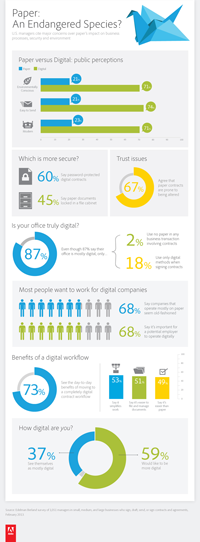Are Businesses Ready to Go Paperless? In Spirit, Yes. In Practice, Not So Much
The onset of the computing revolution in the 1980s and 1990s resulted in most businesses adopting desktop and notebook computers for word processing, accounting, design and various other tasks.
But perhaps the most important thing businesses have used computers for is the printing of paper.
Paper, despite major advances in digital security and cloud storage, remains an essential ingredient in the contracting process. But wait. It’s 2013; weren’t we supposed to be living in the paperless office future that BusinessWeek forecasted way back in 1975?
In Love with the Idea of Paperless but Not Ready to Commit
Adobe commissioned a study of 1,051 U.S. managers at small, medium and large companies who draft, send or sign contracts and agreements. According to the study, 61 percent of managers said working digitally saves on costs; 98 percent of respondents noted they still use paper in their contract transactions.
Only 18 percent of respondents can consider themselves among the paperless elite — their companies have switched to purely digital methods when signing contracts. But even among the managers that said their offices are mostly digital, only 2 percent use no paper in contract transactions.
So what’s the holdup? Adobe’s electronic document, the trusty old PDF, has been around since 1993, and over time, we’ve been able to view, edit and digitally sign documents with ease.
In some industries, compliance and skepticism make paper the status quo. Take healthcare, for example. Many healthcare companies will gladly mail or fax health records but refuse to e-mail them. Some use HIPAA as a deflection, but the real reason is that they don’t have confidence in the security of their email systems.
In the auto industry, some states don’t allow digital proof of insurance. Wyoming, for example, just passed legislation that will allow drivers who are pulled over or involved in a car accident to use their smartphones to provide proof of insurance.
In the end, perhaps cost will drive us toward a paperless reality. Once it becomes prohibitively expensive to print on paper, it will make more sense for businesses to turn exclusively to electronic document management en masse.
Until then, the business world is still crawling, nowhere near walking in its paperless evolution.









